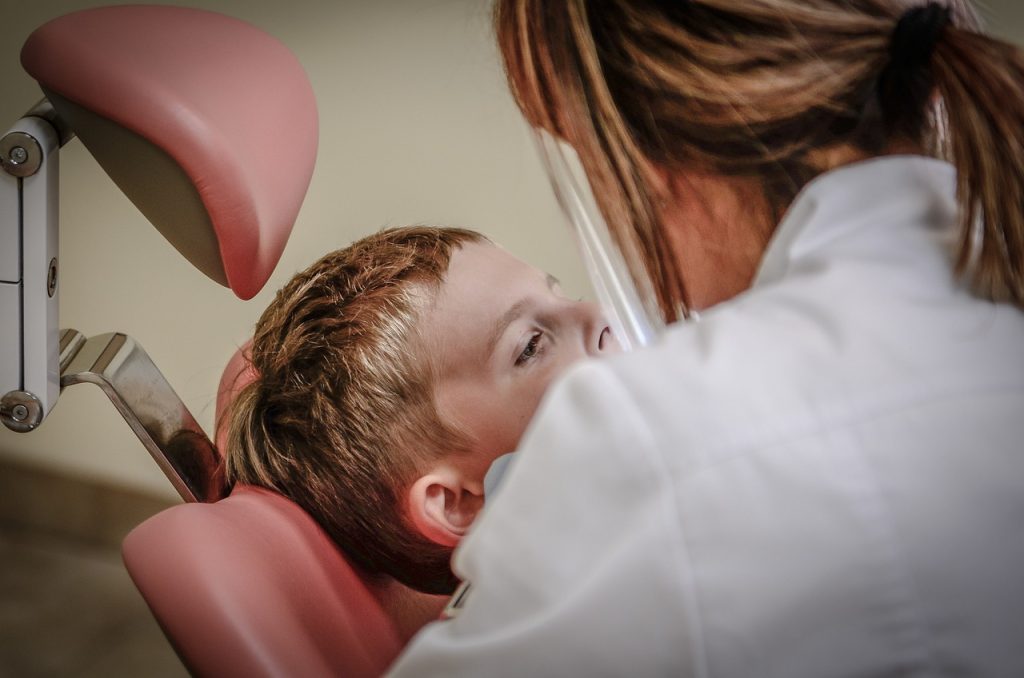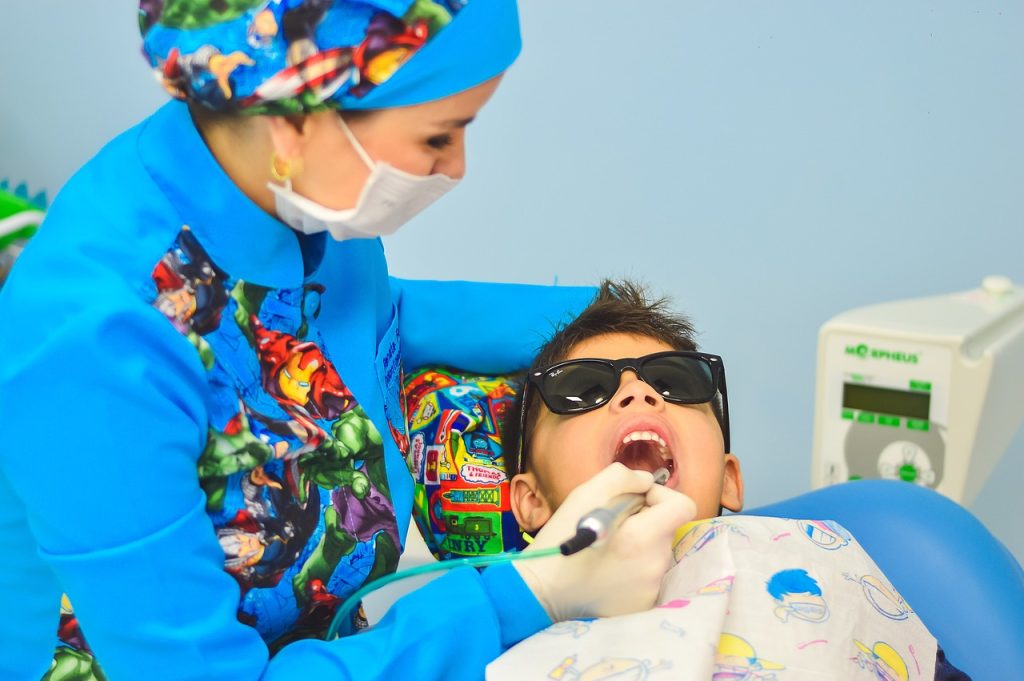Adverts
Oral health is an essential component of overall well-being, influencing not only our ability to eat and speak, but also affecting self-esteem and quality of life. In Brazil, access to adequate dental treatment has historically been a challenge, especially for the portion of the population with resources limited.
In this context, the Brasil Sorridente program emerges as a revolutionary initiative by the Federal Government, launched with the aim of democratizing access to dental care and promoting oral health throughout the country.
Adverts

Smiling Brazil: Getting free dental treatment
This article aims to explore the facets of the Brasil Sorridente program, highlighting how citizens can benefit from free dental treatments. We will cover the history and goals of the program, the services offered, the process for accessing these treatments, as well as sharing inspiring success stories and discussing challenges and opportunities for the future of the program. We will also provide practical tips for maintaining good oral health, emphasizing the importance of prevention and self-care.
At the end of this reading, we hope that readers have a complete understanding of Brasil Sorridente and are equipped with the information necessary to access quality dental care, thus contributing to improving the oral and general health of the Brazilian population.
Adverts
Understanding Smiling Brazil
The Brasil Sorridente program represents a significant milestone in Brazil's public health policy, especially with regard to oral health. Started by the Federal Government in 2004, Brasil Sorridente was designed with the aim of providing universal and equal access to dental services in the country. Before its implementation, dental care in the public health system was limited and often inaccessible to a large portion of the population. The program emerged as a response to this gap, aiming to promote, prevent and restore the oral health of Brazilians.
The strategy adopted by Brasil Sorridente involves several fronts of action. It ranges from expanding the dental care network in the Unified Health System (SUS) to integrating oral health with other health policies. The program prioritizes more vulnerable population groups, such as children, the elderly, people with special needs and indigenous populations.
One of the main components of Brasil Sorridente is the creation of Dental Specialty Centers (CEOs). These centers are equipped to offer more complex treatments, such as endodontics (root canal treatment), specialized periodontics (gum treatment), minor oral surgery and diagnosis for oral cancer. In addition, the program includes the distribution of oral hygiene kits and educational campaigns to promote the prevention of oral diseases.
The impact of Brasil Sorridente on the oral health of the Brazilian population has been remarkable. Since its implementation, there has been a significant improvement in oral health indicators in the country. Data from the Ministry of Health indicate a reduction in the prevalence of tooth decay in children and an increase in the number of people with regular access to dental services. These advances are a direct reflection of investments in infrastructure, professional training and awareness campaigns carried out within the scope of the program.
In addition to the direct benefits to oral health, Brasil Sorridente also plays a crucial role in strengthening the SUS as a whole. By integrating oral health services into primary care networks, the program contributes to the consolidation of a more comprehensive and effective health system that meets the diverse needs of the Brazilian population.
In summary, Brasil Sorridente is an example of a successful public policy, which managed to bring significant changes to oral health in Brazil. By ensuring broader access to quality dental treatments, the program not only improves the quality of life of Brazilians, but also reaffirms the country's commitment to inclusive and equitable public health.
Services Offered by Brasil Sorridente

The Brasil Sorridente program offers a wide range of oral health services, ranging from basic procedures to more complex treatments. These services are fundamental to ensuring the oral health of the population and promoting disease prevention. Below, we detail the main services offered by the program:
- Basic Service: The basis of the program is basic dental care, which includes consultations, diagnosis, prevention and treatment of common oral diseases. Among the procedures offered are cleanings, restorations, simple extractions and fluoride application, all carried out in basic health units.
- Dental Specialty Centers (CEOs): CEOs are fundamental in Brasil Sorridente, offering more specific and complex treatments. They are equipped to perform procedures such as endodontics (root canal treatment), specialized periodontics (gum disease treatment), minor oral surgery, orthodontics, and dentures. These centers are also responsible for diagnosing and referring cases of oral cancer.
- Dentistry for Special Groups: Brasil Sorridente pays special attention to vulnerable groups, including children, the elderly, people with disabilities and indigenous populations. For these groups, the program offers treatments adapted to their specific needs, ensuring an inclusive and accessible approach.
- School Health Program: In partnership with the educational sector, Brasil Sorridente carries out actions to promote oral health in schools. This program includes the distribution of oral hygiene kits and educational activities, focused on teaching healthy habits from childhood.
- Prevention and Education Campaigns: In addition to treatments, the program emphasizes the importance of prevention and oral health education. This includes awareness campaigns about the importance of oral hygiene, adequate nutrition and regular visits to the dentist.
- Distribution of Oral Hygiene Kits: The program also distributes free oral hygiene kits, which include items such as toothbrushes, fluoride toothpaste and dental floss. These kits are essential for promoting daily oral health, especially in underserved communities.
- Training and Qualification of Professionals: Brasil Sorridente invests in the ongoing training and training of oral health professionals. This strategy aims to guarantee the quality and efficiency of services provided to the population.
In summary, the services offered by Brasil Sorridente cover a wide range of dental care, from prevention and education to specialized treatments. This integrated approach is fundamental to ensuring quality oral health for all Brazilians, regardless of their location or socioeconomic status.
How to access free dental treatment
Accessing the free dental treatment services offered by the Brasil Sorridente program is a relatively simple process, but requires knowledge of some essential procedures. This section provides guidance on how to take advantage of these services, detailing the necessary steps from searching for a clinic to receiving dental care.
- Find a Basic Health Unit or CEO Nearby: The first step to accessing Brasil Sorridente services is to find a basic health unit or a Dental Specialties Center (CEO) that is part of the program. This information can be obtained from the municipal health department, on the SUS website or through health applications made available by some city halls.
- Registration in the Unified Health System (SUS): To receive free care, you must be registered with the SUS. Anyone who does not yet have a National Health Card (CNS) must look for a health unit with personal documents (RG, CPF, proof of residence) to register.
- Consultation Scheduling: With the SUS Card in hand, the next step is to schedule an appointment. This can be done directly at the health unit or, in some cases, by phone or municipal health apps. It is important to remember that demand for dental services may vary, resulting in different wait times.
- Initial Consultation and Assessment: At the first appointment, a dentist will perform a complete assessment of the patient's oral health. This assessment is crucial to determining what treatments are needed and the most appropriate care plan.
- Available Treatments: After the evaluation, the dentist will inform you about the treatments available within the program. Depending on individual needs, this may include basic procedures such as cleanings, fillings, extractions or more specialized services at CEOs.
- Follow-up and Subsequent Treatments: Patients must follow the dentist's instructions and attend all scheduled appointments. Depending on the treatment, several visits to the clinic may be necessary.
- Education and Prevention: In addition to treatments, oral health professionals will provide information and guidance on preventive care and maintaining oral hygiene.
By following these steps, citizens can efficiently access the oral health services offered by Brasil Sorridente. It is important to highlight the need to maintain regular monitoring and adopt prevention practices to ensure lasting oral health. This facilitated access to dental care is a right for all Brazilians, contributing significantly to improving the quality of life and general well-being of the population.
Success Stories and testimonials
Success stories and testimonies from beneficiaries are fundamental aspects that illustrate the positive impact of the Brasil Sorridente program on people's lives. These narratives not only highlight the effectiveness of the program, but also serve as a source of inspiration and encouragement for those seeking free dental care. Below, we present some reports that highlight the transformation experienced by several individuals thanks to access to oral health services offered by Brasil Sorridente.
- Transformation in Children's Lives: Maria, mother of two, shares how the program helped improve her children's oral health. Before accessing Brasil Sorridente services, their children suffered from frequent cavities and pain. After regular treatments and guidance on oral hygiene, there was a notable improvement in their dental health, reflected in greater self-esteem and quality of life.
- Smile and Confidence Recovery: João, a 45-year-old worker, reports how free dental treatment restored not only his teeth but also his confidence. He had lost several teeth due to previous neglect and this was impacting his social and professional life. Thanks to the dental prosthetics provided by the program, João recovered his smile and, with it, his self-esteem.
- Overcoming Socioeconomic Barriers: Ana, a resident of a poor community, expresses her gratitude for access to dental treatments that were previously financially inaccessible to her. The program allowed her to receive treatment for gum disease, significantly improving her oral and overall health.
- Education and Prevention: Carlos, a teenager, highlights how educational campaigns and the health program in schools changed his perception of oral health care. The information and habits acquired contributed to the prevention of future dental problems.
These testimonies are just a few examples that reflect the vast and profound impact of Brasil Sorridente. By providing access to quality dental care, the program not only improves individual oral health, but also promotes positive change in the social and emotional lives of beneficiaries. Through these stories, we see the importance of inclusive and accessible public health programs, which have the power to transform lives and strengthen communities.
Challenges and opportunities

Although the Brasil Sorridente program has achieved significant successes, it also faces several challenges that offer opportunities for future improvements and expansions. Understanding these aspects is crucial to ensuring the continued evolution and effectiveness of the program.
- Coverage and Access Challenges: One of the main challenges is expanding coverage to reach remote areas and underserved communities. There is a constant need to increase the number of clinics and professionals involved in the program, especially in underserved regions.
- Funding and Resources: Adequate financing is essential to maintain and expand the services offered. The program must seek sustainable forms of financing to ensure that resources are available where they are needed most.
- Training and Quality of Service: The continuous qualification of professionals is vital to guarantee the quality of the services provided. Investing in the training and development of dentists and other oral health professionals is essential to maintaining high standards of care.
- Integration with Other Health Policies: Brasil Sorridente can benefit even more from its integration with other health policies. Collaboration with general health programs can promote a more holistic approach to health, treating oral health as an integral part of overall well-being.
- Innovation and Technology: The incorporation of new technologies and innovative practices in dentistry can improve the efficiency and effectiveness of treatments. Investing in technology can also facilitate access to dental services, especially in distant areas.
These challenges, although significant, present valuable opportunities for strengthening and improving Brasil Sorridente. By addressing these issues, the program can continue to evolve and play a vital role in improving oral health and, by extension, the quality of life of Brazilian citizens.
Tips and recommendations for maintaining oral health
Simple daily care practices can prevent a range of dental problems and significantly improve quality of life. Here are some detailed tips and recommendations for maintaining optimal oral health:
- Dental Floss Daily: Flossing should be a daily practice, as it removes bacterial plaque and food residue from spaces where the brush cannot reach. Wrap about 18 inches of floss around your middle fingers, carefully guiding it between your teeth with a back-and-forth motion.
- Limit Sugars and Refined Carbohydrates: Foods rich in sugar and refined carbohydrates contribute to the formation of cavities. Choose a balanced diet, rich in fruits, vegetables and whole grains.
- Regular Visits to the Dentist: Regular dental appointments, at least twice a year, are crucial for the prevention and early treatment of dental problems. The dentist can perform professional cleanings, identify problem areas and offer specific treatments.
- Adequate Hydration: Drinking plenty of water helps keep your mouth clean, reduces acidity and reduces the risk of cavities. Water also helps with saliva production, which is vital for oral health.
- Avoid Tobacco and Alcohol: Tobacco use and excessive alcohol consumption are harmful to oral health. They can cause gum disease, cavities, tooth loss and even oral cancer.
- Use of Mouthwash: Mouthwash can be a useful addition to brushing and flossing. It helps reduce plaque, gingivitis, tooth decay and keeps your breath fresh.
- Protection During Sports Activities: If you play sports, consider wearing a mouthguard to protect your teeth from injury.
- Beware of Hard or Sticky Foods: Very hard or sticky foods can damage your teeth. Be cautious when consuming them to avoid breakage or detachment.
By following these tips, you can keep your teeth and gums healthy, reduce your risk of dental problems, and improve your overall health. Remember that taking care of your oral health is a valuable investment in your overall well-being.
Conclusion
Brasil Sorridente, as an innovative and comprehensive public policy, has played a fundamental role in the transformation of oral health in Brazil. This program is not only a milestone in public dentistry, but also a testament to the importance of oral health as an integral part of the general well-being of the population. By offering access to free, quality dental treatment, it has mitigated social and geographic disparities, providing a significant positive impact on the lives of millions of Brazilians.
The success of Brasil Sorridente can be measured not only in terms of the number of treatments carried out or clinics established, but also in the improvement of the quality of life of the people served. The possibility of smiling without embarrassment, eating without pain and speaking without discomfort are fundamental achievements for human dignity, which the program has made possible. The success stories and personal testimonies of patients who had their lives transformed are the greatest indicators of the value of Brasil Sorridente.
However, like any major initiative, the program faces challenges that need to be continually addressed. Expanding coverage, especially in remote and disadvantaged areas, remains a crucial challenge. The continuous training of professionals and the incorporation of new technologies are necessary steps for the evolution and continuous improvement of services. These challenges, however, do not diminish the program's achievements; on the contrary, they offer opportunities to develop and strengthen an even more inclusive and effective oral health policy.
In addition to benefiting from the services offered by Brasil Sorridente, it is important that the population adopts self-care and oral hygiene practices. Prevention is always the best path and small daily actions can have a big impact on preventing dental problems. Therefore, in addition to access to treatments, oral health education and awareness of the importance of prevention must be emphasized.
In short, Brasil Sorridente is an eloquent example of how well-structured public policies focused on the real needs of the population can generate significant and lasting changes. It reaffirms the notion that oral health is everyone's right and a vital component of overall health. Looking to the future, the program is expected to continue to grow and adapt, remaining a pillar of Brazilian public health and a model for similar initiatives in other parts of the world. With the continued commitment of everyone involved – government, healthcare professionals, and the population – Brasil Sorridente will remain a source of healthy smiles and improved lives.
